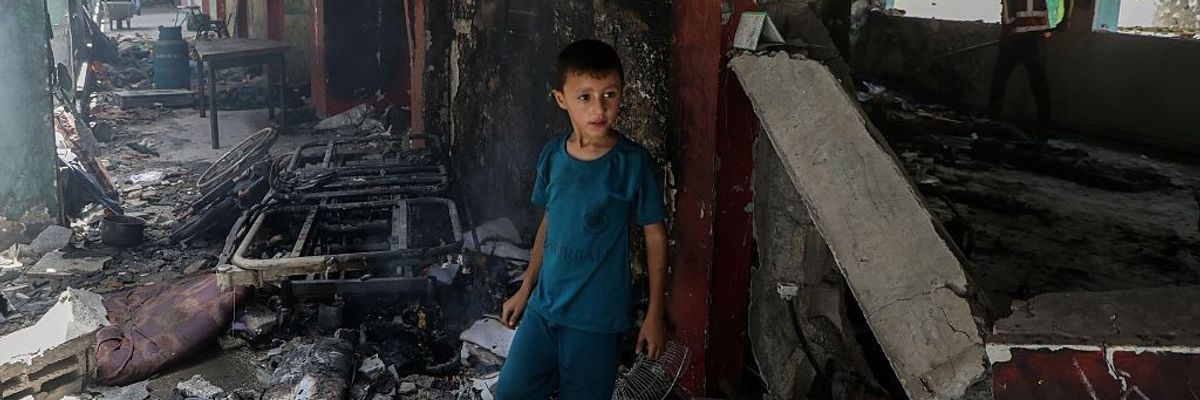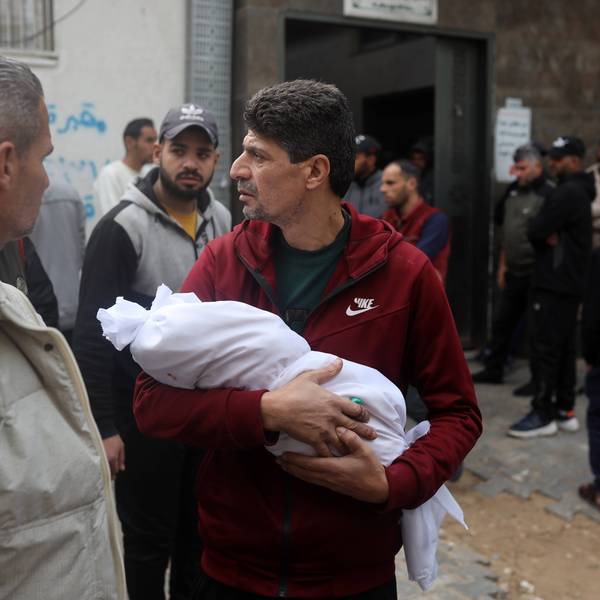
A Palestinian boy is seen at the Fahmi Al-Jarjawi school after an Israeli airstrike in Gaza City on May 26, 2025.
Intensifying Israeli Onslaught Has Displaced 180,000 Palestinians in Just 10 Days
"They call places safe, then attack them," said one Palestinian aid worker. "I'd rather stay home with my family and face whatever comes, at least we all die together, rather than be separated."
A United Nations group said Tuesday that Israel's renewed ground offensive and continued airstrikes in the Gaza Strip displaced roughly 180,000 Palestinians in just 10 days this month, leaving desperate, starving families with nowhere to turn as Israeli forces target shelters and other civilian infrastructure.
The estimate from the International Organization for Migration's Global Camp Coordination and Camp Management (CCCM) Cluster came a day after the Israeli military bombed a school-turned-shelter in Gaza City, killing dozens.
CCCM said Tuesday that direct attacks on shelters for displaced people "have become common" in recent weeks as Israeli forces have moved ahead with Operation Gideon's Chariots, an expansion of Israel's devastating assault on the besieged Palestinian enclave. The official death toll from Israel's assault, which began in the wake of a Hamas-led attack in October 2023, surpassed 54,000 on Tuesday.
"Since the collapse of the cease-fire on 18 March, nearly 616,000 people have been displaced—multiple times, some as many as 10," said the U.N. group. "During the cease-fire, over half a million people went back to their homes, mostly in the north, to try to rebuild their lives. That fragile progress has now been reversed, as intensified military operations are once again displacing families away from the areas they had only recently returned to."
Citing humanitarian partners on the ground, CCCM noted that roughly 80% of the Gaza Strip is either under a displacement order or marked as a "no-go" zone, making most of the enclave's population vulnerable to Israel's ground and aerial onslaught.
"My sibling died in a 'safe' zone after they bombed it," one Palestinian aid worker told CCCM. "They call places safe, then attack them. I'd rather stay home with my family and face whatever comes, at least we all die together, rather than be separated."
CCCM also raised alarm over a newly launched aid scheme led by the Gaza Humanitarian Foundation (GHF), a private organization with ties to the U.S. and Israeli governments.
"These arrangements risk circumventing established humanitarian coordination mechanisms, undermining humanitarian principles, and putting civilians at further risk by promoting displacement without essential protection or adequate access to lifesaving services," the U.N. organization said.
The Euro-Mediterranean Human Rights Monitor echoed that warning, saying in a statement that "all available information about the new Israeli mechanism clearly indicates that it is designed as a tool of coercive control over the Gaza Strip's civilian population."
"It limits families to just one aid parcel per week under highly restrictive security conditions, thus violating the principles of non-discrimination, adequacy, and continuity in humanitarian aid," the group said. "Such limited distribution is not a genuine humanitarian response, but a deliberate policy aimed at barely managing hunger, rather than actually alleviating it."
An Urgent Message From Our Co-Founder
Dear Common Dreams reader, The U.S. is on a fast track to authoritarianism like nothing I've ever seen. Meanwhile, corporate news outlets are utterly capitulating to Trump, twisting their coverage to avoid drawing his ire while lining up to stuff cash in his pockets. That's why I believe that Common Dreams is doing the best and most consequential reporting that we've ever done. Our small but mighty team is a progressive reporting powerhouse, covering the news every day that the corporate media never will. Our mission has always been simple: To inform. To inspire. And to ignite change for the common good. Now here's the key piece that I want all our readers to understand: None of this would be possible without your financial support. That's not just some fundraising cliche. It's the absolute and literal truth. We don't accept corporate advertising and never will. We don't have a paywall because we don't think people should be blocked from critical news based on their ability to pay. Everything we do is funded by the donations of readers like you. Will you donate now to help power the nonprofit, independent reporting of Common Dreams? Thank you for being a vital member of our community. Together, we can keep independent journalism alive when it’s needed most. - Craig Brown, Co-founder |
A United Nations group said Tuesday that Israel's renewed ground offensive and continued airstrikes in the Gaza Strip displaced roughly 180,000 Palestinians in just 10 days this month, leaving desperate, starving families with nowhere to turn as Israeli forces target shelters and other civilian infrastructure.
The estimate from the International Organization for Migration's Global Camp Coordination and Camp Management (CCCM) Cluster came a day after the Israeli military bombed a school-turned-shelter in Gaza City, killing dozens.
CCCM said Tuesday that direct attacks on shelters for displaced people "have become common" in recent weeks as Israeli forces have moved ahead with Operation Gideon's Chariots, an expansion of Israel's devastating assault on the besieged Palestinian enclave. The official death toll from Israel's assault, which began in the wake of a Hamas-led attack in October 2023, surpassed 54,000 on Tuesday.
"Since the collapse of the cease-fire on 18 March, nearly 616,000 people have been displaced—multiple times, some as many as 10," said the U.N. group. "During the cease-fire, over half a million people went back to their homes, mostly in the north, to try to rebuild their lives. That fragile progress has now been reversed, as intensified military operations are once again displacing families away from the areas they had only recently returned to."
Citing humanitarian partners on the ground, CCCM noted that roughly 80% of the Gaza Strip is either under a displacement order or marked as a "no-go" zone, making most of the enclave's population vulnerable to Israel's ground and aerial onslaught.
"My sibling died in a 'safe' zone after they bombed it," one Palestinian aid worker told CCCM. "They call places safe, then attack them. I'd rather stay home with my family and face whatever comes, at least we all die together, rather than be separated."
CCCM also raised alarm over a newly launched aid scheme led by the Gaza Humanitarian Foundation (GHF), a private organization with ties to the U.S. and Israeli governments.
"These arrangements risk circumventing established humanitarian coordination mechanisms, undermining humanitarian principles, and putting civilians at further risk by promoting displacement without essential protection or adequate access to lifesaving services," the U.N. organization said.
The Euro-Mediterranean Human Rights Monitor echoed that warning, saying in a statement that "all available information about the new Israeli mechanism clearly indicates that it is designed as a tool of coercive control over the Gaza Strip's civilian population."
"It limits families to just one aid parcel per week under highly restrictive security conditions, thus violating the principles of non-discrimination, adequacy, and continuity in humanitarian aid," the group said. "Such limited distribution is not a genuine humanitarian response, but a deliberate policy aimed at barely managing hunger, rather than actually alleviating it."
A United Nations group said Tuesday that Israel's renewed ground offensive and continued airstrikes in the Gaza Strip displaced roughly 180,000 Palestinians in just 10 days this month, leaving desperate, starving families with nowhere to turn as Israeli forces target shelters and other civilian infrastructure.
The estimate from the International Organization for Migration's Global Camp Coordination and Camp Management (CCCM) Cluster came a day after the Israeli military bombed a school-turned-shelter in Gaza City, killing dozens.
CCCM said Tuesday that direct attacks on shelters for displaced people "have become common" in recent weeks as Israeli forces have moved ahead with Operation Gideon's Chariots, an expansion of Israel's devastating assault on the besieged Palestinian enclave. The official death toll from Israel's assault, which began in the wake of a Hamas-led attack in October 2023, surpassed 54,000 on Tuesday.
"Since the collapse of the cease-fire on 18 March, nearly 616,000 people have been displaced—multiple times, some as many as 10," said the U.N. group. "During the cease-fire, over half a million people went back to their homes, mostly in the north, to try to rebuild their lives. That fragile progress has now been reversed, as intensified military operations are once again displacing families away from the areas they had only recently returned to."
Citing humanitarian partners on the ground, CCCM noted that roughly 80% of the Gaza Strip is either under a displacement order or marked as a "no-go" zone, making most of the enclave's population vulnerable to Israel's ground and aerial onslaught.
"My sibling died in a 'safe' zone after they bombed it," one Palestinian aid worker told CCCM. "They call places safe, then attack them. I'd rather stay home with my family and face whatever comes, at least we all die together, rather than be separated."
CCCM also raised alarm over a newly launched aid scheme led by the Gaza Humanitarian Foundation (GHF), a private organization with ties to the U.S. and Israeli governments.
"These arrangements risk circumventing established humanitarian coordination mechanisms, undermining humanitarian principles, and putting civilians at further risk by promoting displacement without essential protection or adequate access to lifesaving services," the U.N. organization said.
The Euro-Mediterranean Human Rights Monitor echoed that warning, saying in a statement that "all available information about the new Israeli mechanism clearly indicates that it is designed as a tool of coercive control over the Gaza Strip's civilian population."
"It limits families to just one aid parcel per week under highly restrictive security conditions, thus violating the principles of non-discrimination, adequacy, and continuity in humanitarian aid," the group said. "Such limited distribution is not a genuine humanitarian response, but a deliberate policy aimed at barely managing hunger, rather than actually alleviating it."

